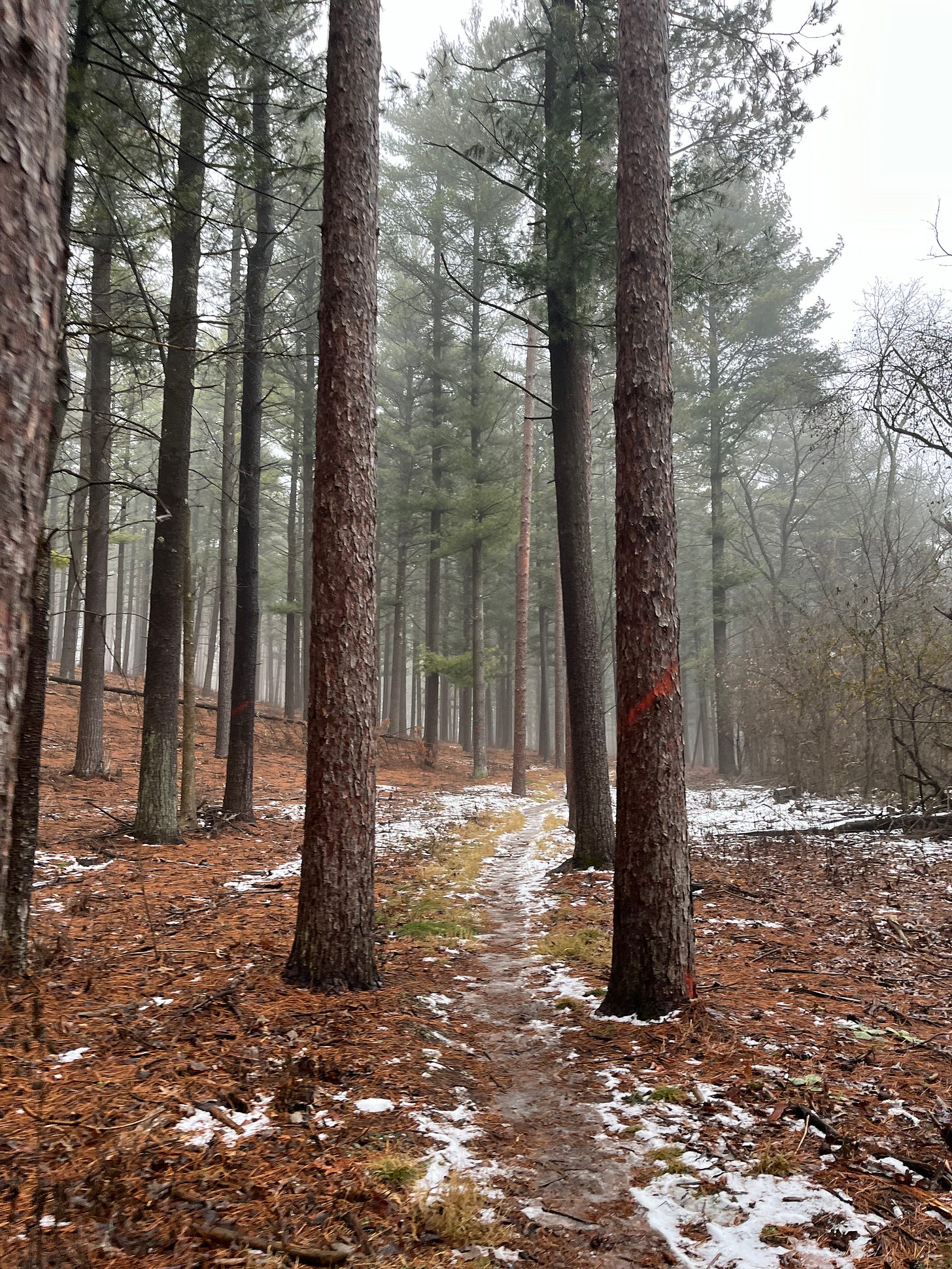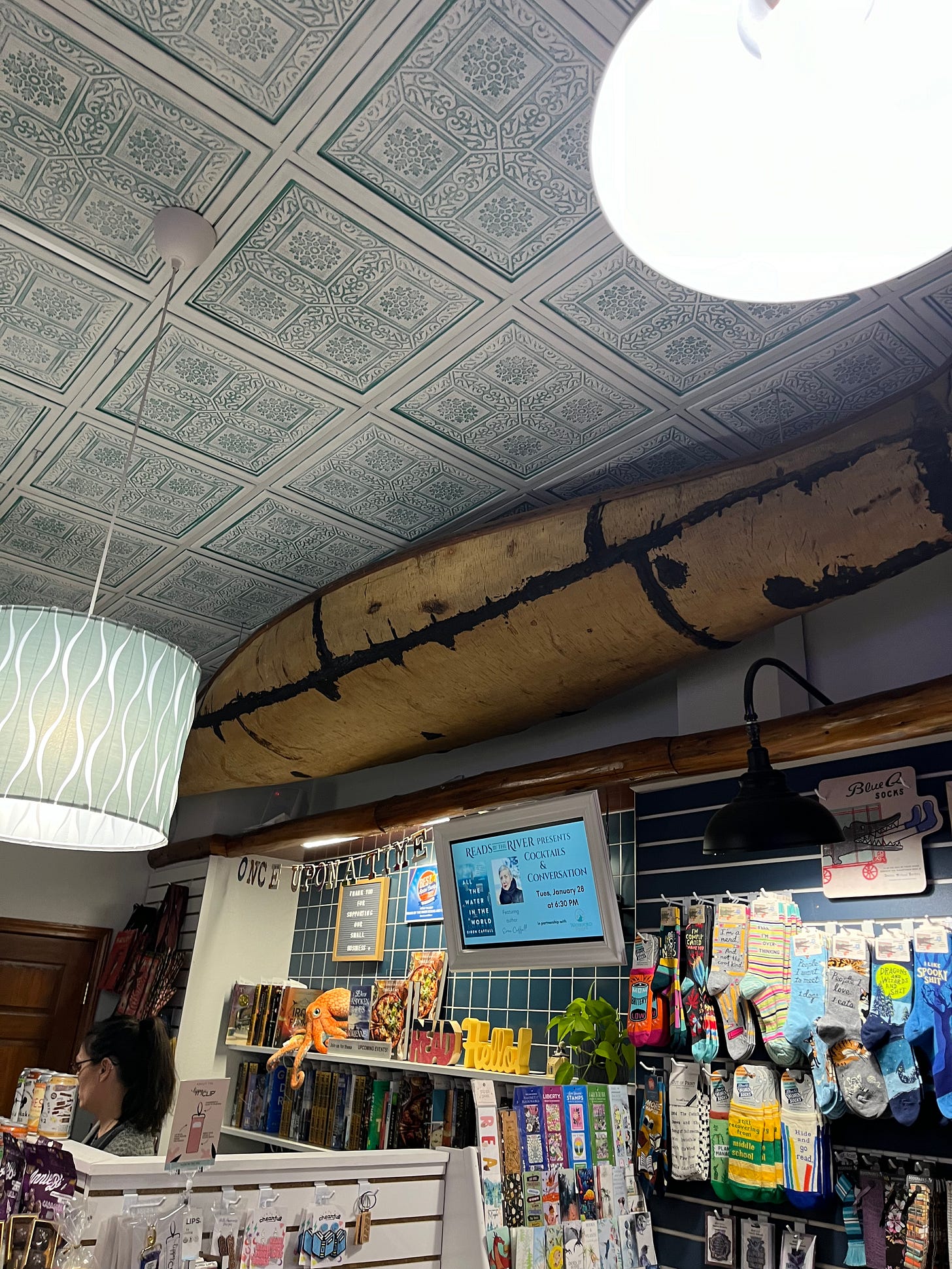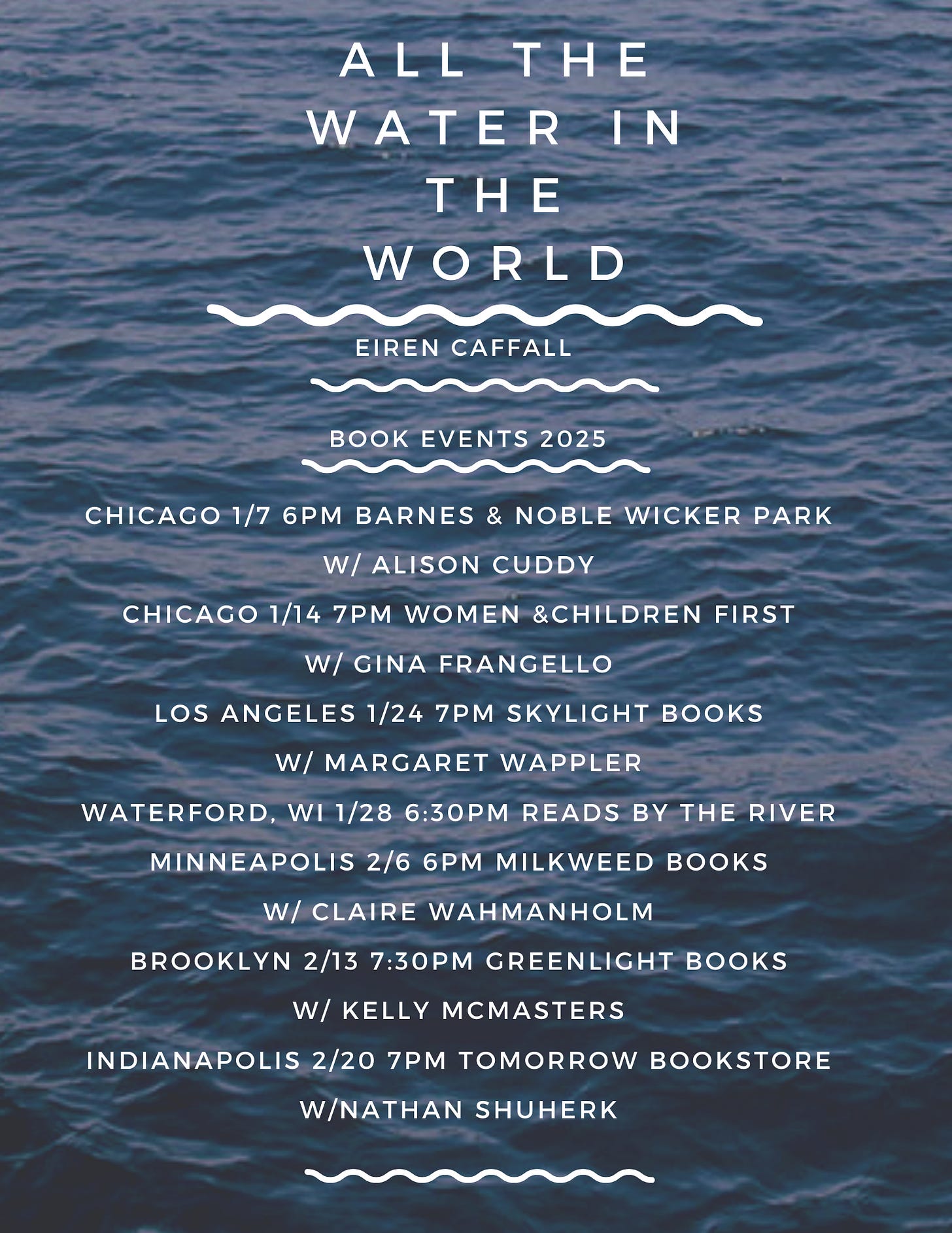It isn’t spring yet. It is only February, but leaving behind the wildness of January—of December, of November, of what month is it—is an emergence out of the dark, flooded zone of this horrible time in the country I love.
Today, I’ll go back to the woods outside of Chicago again for the first time in a while, walking trails with Andy and our friend Rob, maybe even my favorite trail, south of the city, where a small prairie sits as far from roads as you can get in Cook County, surrounded by glacial eskers and ponds thick with spring peepers in April, noisy and alive. Today the grasses will be brittle, the frogs quiet. It isn’t spring yet.
After Christmas, my family walked a portion of the Ice Age Trail in a thick fog, pines dripping, icy snow on the trail and the hills, the hilly landscape treacherous and slick. We walked together with our kids and their friends, using poles, spotting each other as we hiked up or down portions that felt frightening. The fog amplified our voices, hid the tops of the plantation pines, made the place haunted and lovely, almost warm in the weird weather. It felt like a metaphor for the moment, the breath between the election and the first days of the new regime. It was dangerous, we watched out for each other. It was uncanny, we remarked on it. It was cold, we held hands. It felt like spring, like my memories of the Berkshire Hills in April, where packed, serially melted snow pulsed cold next to crocuses and tender shoots of grass. But in Wisconsin, we should have had deep snow, spikes on our boots to manage the trail, not clots of mud. It isn’t spring yet.
We’re still flooded, of course, flooded by the cruelty of the moment. Holding hands in the peril. But there is a little light breaking in my own heart at least, where the sun is coming up and we can see the damage at last. I picture now a scene in my novel, my characters in the birchbark canoe that has saved them as their home collapsed, the waters still dangerous, but the weak sun of dawn reflecting down into the floodwaters over Central Park, showing the tops of trees. I’m in the flooded zone.
It is strange to put out a book in this moment, especially All the Water in the World, a novel about ecocollapse and survival, about saving what we can.
I love this book so much. I wrote it because I couldn’t sleep, because of fear about ecosystemic apocalypse, because of fear about climate change, because of fear about my own vulnerable little family. I dearly want to press it into reader’s hands, to tell them, “Here, I wrote this for you, for just this moment, for hope that isn’t blind, for community that isn’t frightened. It will make you feel better. I promise.”
I say this in interviews, in articles, in posts, and I’ve been struggling with how to say this here.
When my last book, The Mourner’s Bestiary, came out back in October, before the election, writing a post on my book’s birthday felt clean, optimistic, simpler. I was spending every weekend canvassing in Wisconsin with the Union. I was walking miles in hope and with grit, and with people who greeted each other every Saturday morning with the phrase, “It is a great day to save democracy!”
Since then, knowing what to put into this letter has been a little more complicated. I have tried to write trail reports, I have tried to do roundups of my interviews, publications, podcasts, reviews. I want to make sure that, since social media is completely shattered, there is somewhere you can find the news of the wild and amazing year I’m having with these two books. But it has been challenging. Even though there is cake.
All the Water published on the day that the Palisades fire began. I had three book events in Chicago before inauguration day, including the precious feminist bookstore Women and Children First, where it felt like my book was finally born. My first book event out of town was in at Skylight Books in LA, two weeks after the start of the fires. When asked at that event by Margaret Wappler if, like my characters, anyone in the sold out crowd had made a go bag in the last two weeks, every single hand was raised. One reader came to my signing table and told me he loved the book, was dying for a sequel, “What happens with Nonie and the boats?!” he asked. “I really want my wife to read this,” he said, “she’ll love it! But her house just burned down. She’s taking a minute.”
The next day, Dex and I walked up a small hill in Los Angeles with a friend, the one I’d been staying with, the one who let us stay so we wouldn’t be a drain on hotel resources, who waited patiently as I emailed Skylight Books over the weeks post-fire to make sure that my event would do more good than harm. We stood in the warmth, what felt like spring to Dex and I. Dex was about to go back to college. I was about to go home for more events in Wisconsin, Minnesota, New York, Indiana, Iowa, Chicago, then back to LA when it really will be spring here again. So many places to sit in beautiful independent bookstores with beloved friends and writers who are asking good questions and talking through the central idea in the book—that even when everything collapses, we can save what matters, especially each other.
I wrote an article about just that in LitHub, which came out in the first week of my novel’s life. I wrote about it in my post for Barnes & Noble’s website because I was their Discover Book for January. I keep saying it in interviews. Not even a month after my book’s birthday, my colleagues in climate work are frantically sending each other downloads from federal websites tracking scientific data, health data, climate data, reproductive data as that data is erased by the new administration. I didn’t expect my writing on saving all we can in the face of collapse to be this timely and pointed. But I hope that people read the book and find a respite in facing the question of how we will go on and answering it with the knowledge that we will go on to protect each other.
At the top of that hill in LA, we could see the bowl of the whole city, the light haze, which, by that point, was likely more the marine layer than smoke. The fires and their aftermath were invisible. The flowers smelled incredible; the sunshine lit me up. We took pictures, marveled at the parade of Angelinos exercising, realized we didn’t know the names of the plants there. It felt like a glimpse at grace, a breath before plunging back into the work.
Here at home, in the small breath before the next travel, I have had interviews and an event, another sold out room full of people all asking the same question—how do we keep each other safe? Here at home, it is a false spring, a warm stretch, and I’ll go to the woods. Here at home, I’ll keep calling my representatives. Here at home, I’ll keep donating to trans justice organizations. Here at home, I’ll keep saying the truth. Here at home, the groundhog announced six more weeks of winter. It isn’t spring yet. Here at home, the zone is flooded with bad news, with a soft coup, with data disappearance, with chaos, with fear. Here at home, I’ll keep walking into public spaces where I will say that we can survive this, we can all survive this.
There is a dawn over the flooded world, there is a shore. Let’s keep paddling towards it.
I love you.
I’ll write soon,
Eiren
PS.
I promised you a roundup of all the things you may have missed as I’ve only been posting good news on my Instagram stories. Make of that what you will. I’ve included a list of public events from now through March as well. Come and see me!!
Below I’ve listed everything I can remember in the piles of amazing interactions I’ve had for the book. It has been an incredible ride. I have seen and heard from readers who have devoured it since the election, since the fires, since the inauguration, needing it, gaining strength from it, pressing into the hands of loved ones. I’ve had the best interviews. Some are still to air, but I’ll post those when they do!
All the Water in the World
Barnes & Noble Discover Book for January!
Strand Bookstore Sci-Fi Pick for January!
Amazon Editor’s Pick for January.
Marie Claire’s 15 Most Anticipated Novels of 2025!
New Scientist best new sci-fi books this January.
LitHub article What Will You Save When the Climate Crisis Comes for You?
Chicago Review of Books interview with Jenny Bartoy!
Chicago Review of Books Must Read Books of January!
Barnes & Noble Reads Guest Post.
Interview with Alison Stevens on All of It on WNYC.
The Mourner’s Bestiary
Maybe my favorite thing that happened last month (was it last month?) was that Nathan Shuherk aka Schizophrenic Reads, read my book and added it to his favorite nonfiction books of 2024. I was number ten! He did a follow up video including fiction, and I was still in the top twenty! I love Nathan’s reading taste, and his excellent brain. I have subscribed to his newsletter and if you are here, you should too. You can come and see me be a huge fan of his at Tomorrow Books in Indianapolis on February 20.
Named one of the best memoirs of 2024 in Esquire!
House of Speakeasy Performance!
Let’s Talk Memoir with Ronit Plank!
Interview with Texas Public Radio’s Book Public with Yvette Benevides!
Nature Revisited with Stefan van Norden!
I’m sure I’ve forgotten something!













Eiren: I'm posting tomorrow morning @ David's Lists 2.0--"Weekday Updates"--adding some titles to earlier lists . . . you make a cameo appearance--I also put a link to your Stack in the notes.
[https://longd.substack.com/]
It isn’t spring yet. This hopeful and chilling refrain echoes and reminds me that you’re a musician. And this rings true: “But I hope that people read the book and find a respite in facing the question of how we will go on and answering it with the knowledge that we will go on to protect each other.” Thank you for the respite.